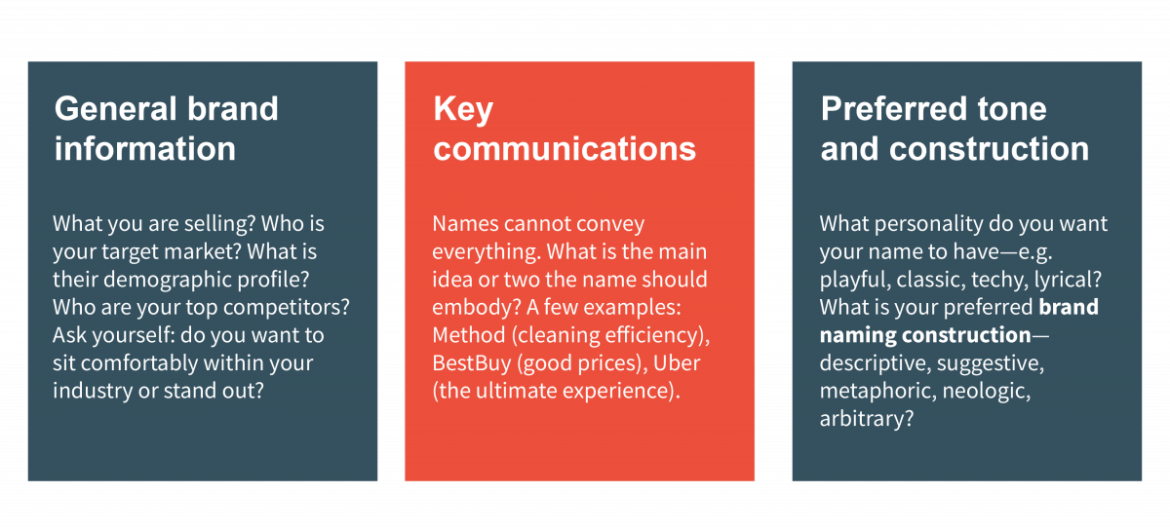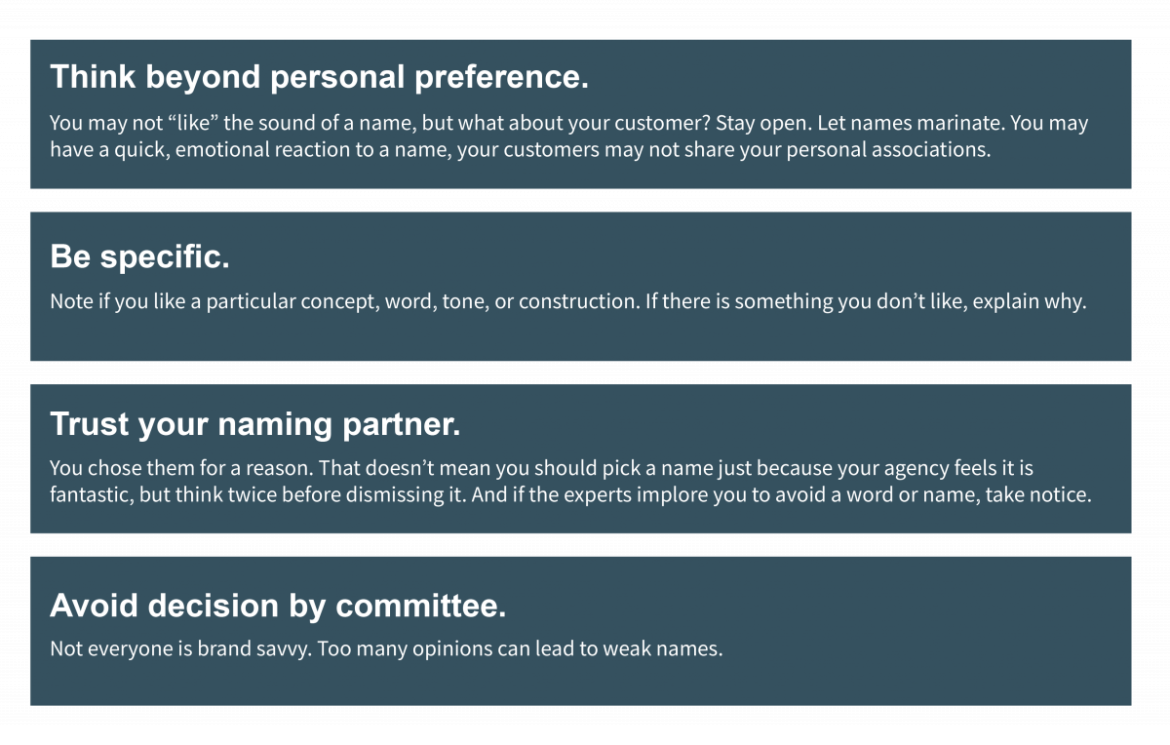

Updated February 5, 2026
Naming a new company or product line is hard work. If you’re weighing whether to do it yourself or partner with a professional naming agency, both options can work. However, they come with very different time, cost, and risk trade-offs.
Congratulations—you have launched a new product or company. Now you need a name, one that is not only reflective of your brand personality but one that can withstand extensive legal screenings and lend itself to a strong domain.
One of the first decisions you will need to make about your name is whether you would like to develop it on your own or work with a naming agency.
Looking for a Public Relations agency?
Compare our list of top Public Relations companies near you
Whether you decide to DIY your name or hire a naming agency, both options have benefits and potential challenges. Let’s take a look at each.
The benefits of naming your company or product yourself or with the help of your in-house team include:
Naming, however, is a difficult, complicated process that will probably require more time and energy than you expect. In practice, businesses that name in-house often underestimate the time required and overestimate how easily a name will pass legal and domain screening. This is why many founders begin the process on their own and later turn to brand naming services after hitting roadblocks.
Companies choose to partner with professional branding and naming agencies because they trust their experience, creativity, and legal expertise.
If the process is managed correctly, outsourcing naming should save you time and result in a short list of powerful names you may not have come up with on your own.
The benefits of partnering with a naming agency include:
If you decide to go with an agency, they will drive the process, but your ability to communicate your business objectives and preferences will play a big role in determining the effectiveness of your relationship.
If you are considering outsourcing the naming of your brand or product to an agency, one of the first practical questions is the cost.
According to the Clutch Branding Pricing Guide, most branding projects, which often include naming in addition to other branding work, fall between $10,000 and $49,999, based on verified client reviews. Larger or more complex projects can exceed this range.
For naming specifically, Clutch reports typical agency rates of $100–$149 per hour.
This hourly range is consistent with related branding services such as brand strategy and messaging, reflecting the level of research, creative development, and expertise involved.
However, the final cost is dependent on a variety of factors, including:
For many businesses, budgeting $10,000+ provides a realistic starting point when exploring professional naming support.
If you’re still unsure whether it makes sense to hire a brand naming agency, it may be a good idea if you:
If none of the above apply, naming in-house may be a reasonable starting point. If several do, professional brand naming services can significantly reduce risk and guesswork.
At a high level, professional naming projects move from research and strategy to creative exploration, to legal validation.
If you’ve never worked with a naming agency before, the process can feel opaque. While every firm customizes its approach, most professional naming engagements follow a similar structure that balances creativity, strategy, and legal viability.
A naming agency knows the type of information it needs to do its job best. In addition to asking you pointed questions during your phone or in-person meetings, an agency will typically ask you to fill out a Naming Questionnaire.
Naming Questionnaires vary, but most agencies will ask you questions in the following areas:

The agency will ask you for general brand information, key communications, and preferred tone and style to learn about your company and the type of name that best suits it.
Once you have provided your naming agency with the completed questionnaire, they will develop a naming strategy and summarize it in a creative brief. This brief is like a blueprint—it helps the naming team build viable name candidates.
One of the most critical functions of the naming brief is to identify naming themes—also known as territories, pathways, or routes.
For example, let’s say you are seeking a name for a marketing agency that helps grow women’s indie brands into established ones. Three possible naming themes might be: growth, bold and brilliant women, or democracy. Each of these themes would generate different kinds of names.
Generally, a naming agency may employ anywhere from two to six namers to participate in name development. Although every namer has a different approach to name generation, one thing is certain: Naming is an exhaustive enterprise. Many projects require namers to generate hundreds of initial ideas.
The namers will use the brief as a starting point and likely explore literary and cultural references, metaphors, translations of keywords into foreign languages, interesting spellings, and suffixes and prefixes.
They will study the copy of relevant industries in magazines, search venture firm portfolios, and much more to find interesting ideas.
The one thing most qualified agencies do not do is rely on a thesaurus. This is just a starting point. First, the most relevant dictionary words that are similar to a concept of interest will already be in use. In addition, a thesaurus doesn’t encourage lateral thinking—the solving of a problem through a new or indirect approach.
The role of lateral thinking in naming cannot be overestimated. One of the approaches we take at River + Wolf is to wander through stores selling products distinct from those we are naming. This often prompts unusual ideas.
Wine names, for example, might inspire creative names for a clothing brand line. Computer technology names could spark ideas for a new bicycle or yoga-wear name. The names of tulip varieties could make for interesting social media handles.
Once your naming agency is satisfied that the team has pursued every possible angle, they will whittle down their choices to the strongest contenders.
Next, the agency presents its work to you – either on-site or over a teleconference call.
Although presentation formats vary from agency to agency, many use PowerPoint with a single name per slide and a rationale for each slide. And although it is possible to do only one round of naming, most agencies prefer at least two.
Despite a well-articulated brief and in-depth upfront strategy sessions, it is sometimes challenging for clients to know what they want—or don’t want—until they have seen a pool of names. It is not uncommon for the first round to lead to a new or modified set of naming parameters.
Depending on your agency, you will be viewing either unscreened or pre-screened names. Each approach has pros and cons.
In presenting a broader list that hasn’t been subjected to a serious preliminary or knockout screening conducted by an IP attorney, there is a risk that you could fall in love with a name that is confusingly similar in sound, appearance, or meaning to a mark already registered or pending in the same trademark class at the United States Patent and Trademark Office (or its international counterparts).
Sharing a too-narrow list, however, might not offer enough choice for some clients.
Whatever approach you take, most agencies require between 3 to 6 weeks for a standard project. Large corporate projects and global naming can take much longer.
Remember, an agency and a client are a partnership. To help ensure you get the best work possible from your agency partner, remember to do the following:

Think beyond personal preference, be specific, trust your naming partner, and avoid decision by committee.
A preliminary trademark search is not sufficient. A qualified attorney must conduct a full or comprehensive search before registering a name, because protection can also arise from names that have not been registered with the USPTO.
Continuously using your name in connection with your goods and services leads to common law trademark rights. That said, these rights only extend to the places where the trademark has been used in commerce. You will also have other important rights if you register with the USPTO.
Additionally, if you do not register, you will not have the right to use the ® symbol to give notice of your mark’s status.
For a very brief overview of trademark issues, visit River + Wolf’s blog.
If you are operating in international markets, you will also want your naming agency to conduct a global linguistic check with native speakers in the countries where you will be selling.
In sum, namers are experts in what they do, but it is your job to provide the agency with detailed, well-thought-out information to help ensure they hit the mark.
You should also be prepared to provide constructive feedback throughout the process so that, together, you can complete the elusive, exhausting, but always fulfilling task of finding an exceptional name.


